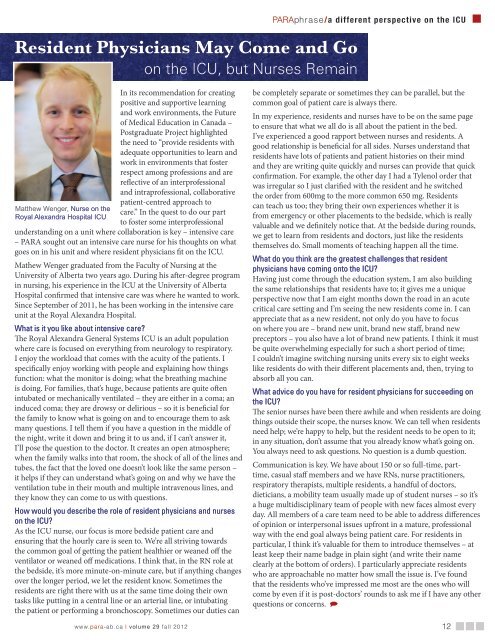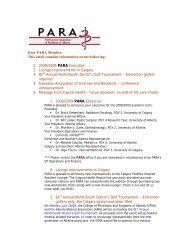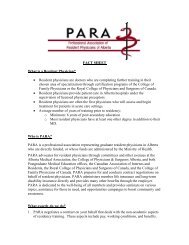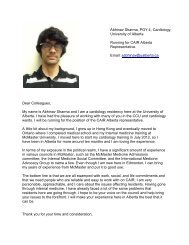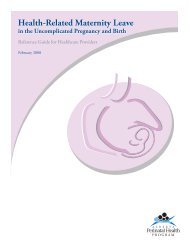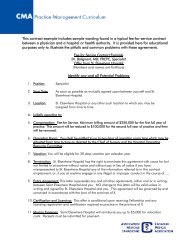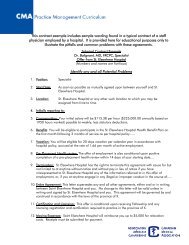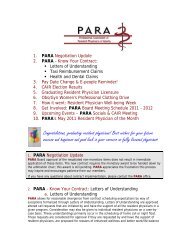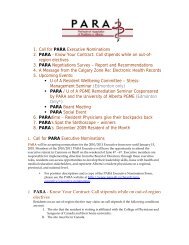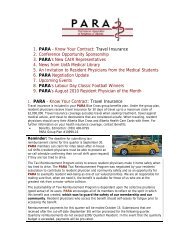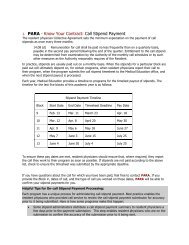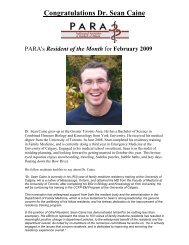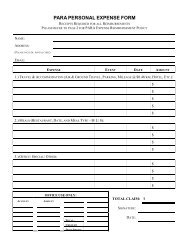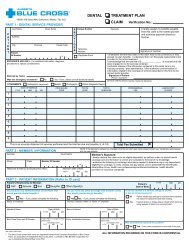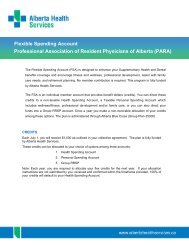PARAphrase Fall 2012
PARAphrase Fall 2012
PARAphrase Fall 2012
Create successful ePaper yourself
Turn your PDF publications into a flip-book with our unique Google optimized e-Paper software.
Resident Physicians May Come and Go<br />
on the ICU, but Nurses Remain<br />
<strong>PARAphrase</strong>/a different perspective on the ICU<br />
Matthew Wenger, Nurse on the<br />
Royal Alexandra Hospital ICU<br />
In its recommendation for creating<br />
positive and supportive learning<br />
and work environments, the Future<br />
of Medical Education in Canada –<br />
Postgraduate Project highlighted<br />
the need to “provide residents with<br />
adequate opportunities to learn and<br />
work in environments that foster<br />
respect among professions and are<br />
reflective of an interprofessional<br />
and intraprofessional, collaborative<br />
patient-centred approach to<br />
care.” In the quest to do our part<br />
to foster some interprofessional<br />
understanding on a unit where collaboration is key – intensive care<br />
– PARA sought out an intensive care nurse for his thoughts on what<br />
goes on in his unit and where resident physicians fit on the ICU.<br />
Mathew Wenger graduated from the Faculty of Nursing at the<br />
University of Alberta two years ago. During his after-degree program<br />
in nursing, his experience in the ICU at the University of Alberta<br />
Hospital confirmed that intensive care was where he wanted to work.<br />
Since September of 2011, he has been working in the intensive care<br />
unit at the Royal Alexandra Hospital.<br />
What is it you like about intensive care?<br />
The Royal Alexandra General Systems ICU is an adult population<br />
where care is focused on everything from neurology to respiratory.<br />
I enjoy the workload that comes with the acuity of the patients. I<br />
specifically enjoy working with people and explaining how things<br />
function: what the monitor is doing; what the breathing machine<br />
is doing. For families, that’s huge, because patients are quite often<br />
intubated or mechanically ventilated – they are either in a coma; an<br />
induced coma; they are drowsy or delirious – so it is beneficial for<br />
the family to know what is going on and to encourage them to ask<br />
many questions. I tell them if you have a question in the middle of<br />
the night, write it down and bring it to us and, if I can’t answer it,<br />
I’ll pose the question to the doctor. It creates an open atmosphere;<br />
when the family walks into that room, the shock of all of the lines and<br />
tubes, the fact that the loved one doesn’t look like the same person –<br />
it helps if they can understand what’s going on and why we have the<br />
ventilation tube in their mouth and multiple intravenous lines, and<br />
they know they can come to us with questions.<br />
How would you describe the role of resident physicians and nurses<br />
on the ICU?<br />
As the ICU nurse, our focus is more bedside patient care and<br />
ensuring that the hourly care is seen to. We’re all striving towards<br />
the common goal of getting the patient healthier or weaned off the<br />
ventilator or weaned off medications. I think that, in the RN role at<br />
the bedside, it’s more minute-on-minute care, but if anything changes<br />
over the longer period, we let the resident know. Sometimes the<br />
residents are right there with us at the same time doing their own<br />
tasks like putting in a central line or an arterial line, or intubating<br />
the patient or performing a bronchoscopy. Sometimes our duties can<br />
be completely separate or sometimes they can be parallel, but the<br />
common goal of patient care is always there.<br />
In my experience, residents and nurses have to be on the same page<br />
to ensure that what we all do is all about the patient in the bed.<br />
I’ve experienced a good rapport between nurses and residents. A<br />
good relationship is beneficial for all sides. Nurses understand that<br />
residents have lots of patients and patient histories on their mind<br />
and they are writing quite quickly and nurses can provide that quick<br />
confirmation. For example, the other day I had a Tylenol order that<br />
was irregular so I just clarified with the resident and he switched<br />
the order from 600mg to the more common 650 mg. Residents<br />
can teach us too; they bring their own experiences whether it is<br />
from emergency or other placements to the bedside, which is really<br />
valuable and we definitely notice that. At the bedside during rounds,<br />
we get to learn from residents and doctors, just like the residents<br />
themselves do. Small moments of teaching happen all the time.<br />
What do you think are the greatest challenges that resident<br />
physicians have coming onto the ICU?<br />
Having just come through the education system, I am also building<br />
the same relationships that residents have to; it gives me a unique<br />
perspective now that I am eight months down the road in an acute<br />
critical care setting and I’m seeing the new residents come in. I can<br />
appreciate that as a new resident, not only do you have to focus<br />
on where you are – brand new unit, brand new staff, brand new<br />
preceptors – you also have a lot of brand new patients. I think it must<br />
be quite overwhelming especially for such a short period of time;<br />
I couldn’t imagine switching nursing units every six to eight weeks<br />
like residents do with their different placements and, then, trying to<br />
absorb all you can.<br />
What advice do you have for resident physicians for succeeding on<br />
the ICU?<br />
The senior nurses have been there awhile and when residents are doing<br />
things outside their scope, the nurses know. We can tell when residents<br />
need help; we’re happy to help, but the resident needs to be open to it;<br />
in any situation, don’t assume that you already know what’s going on.<br />
You always need to ask questions. No question is a dumb question.<br />
Communication is key. We have about 150 or so full-time, parttime,<br />
casual staff members and we have RNs, nurse practitioners,<br />
respiratory therapists, multiple residents, a handful of doctors,<br />
dieticians, a mobility team usually made up of student nurses – so it’s<br />
a huge multidisciplinary team of people with new faces almost every<br />
day. All members of a care team need to be able to address differences<br />
of opinion or interpersonal issues upfront in a mature, professional<br />
way with the end goal always being patient care. For residents in<br />
particular, I think it’s valuable for them to introduce themselves – at<br />
least keep their name badge in plain sight (and write their name<br />
clearly at the bottom of orders). I particularly appreciate residents<br />
who are approachable no matter how small the issue is. I’ve found<br />
that the residents who’ve impressed me most are the ones who will<br />
come by even if it is post-doctors’ rounds to ask me if I have any other<br />
questions or concerns. <br />
www.para-ab.ca | volume 29 fall <strong>2012</strong> 12


